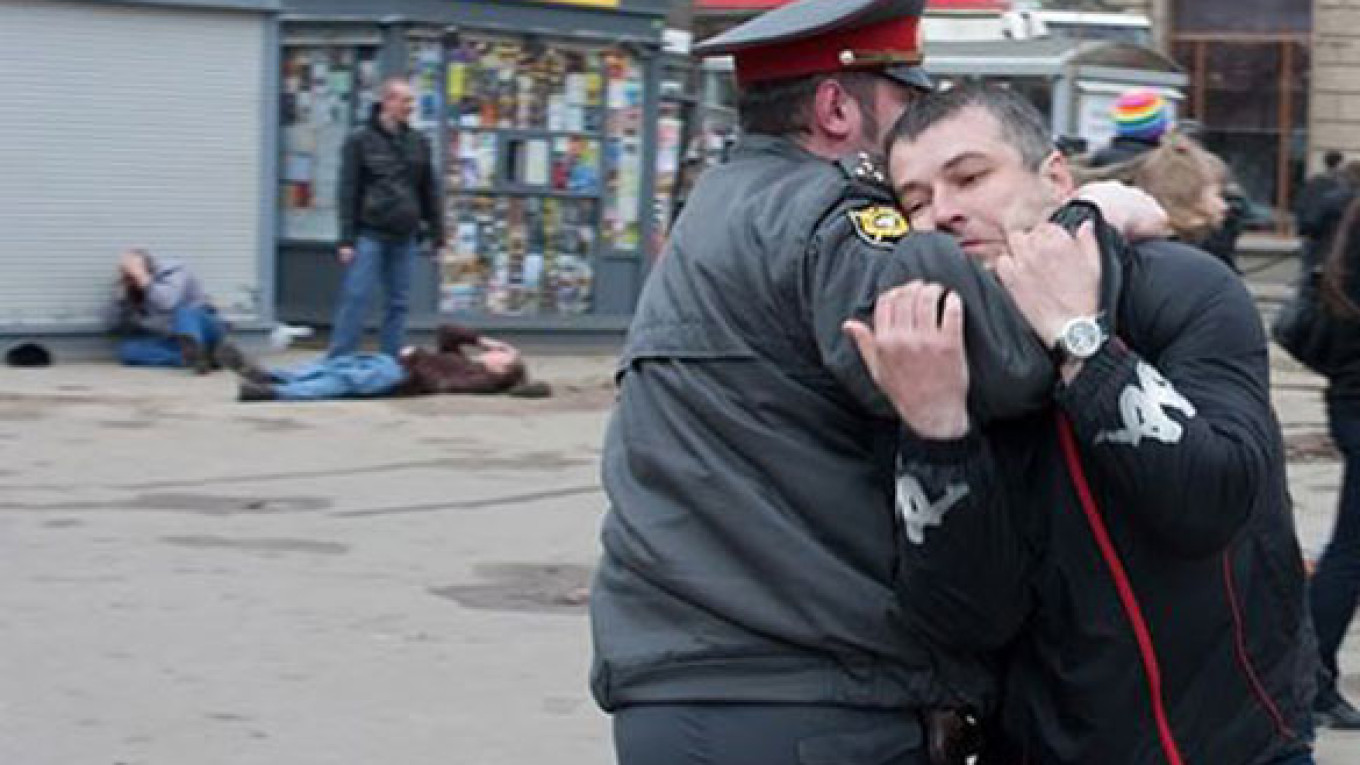ST. PETERSBURG —? Young people who gathered to celebrate spring by blowing bubbles at an annual flash mob in central St. Petersburg were attacked by a group of suspected neo-Nazis who mistook the gathering for a gay pride event, flash mob organizers said.
Some 500 people stood blowing bubbles on the steps of Gorkovskaya metro station and in the surrounding Alexandrovsky Park at about 4 p.m. Sunday — the agreed time for the start of the flash mob — when about 30 men ran up and started beating them and firing rubber bullets.
Several people fell to the ground before the attackers fled at the sight of approaching OMON riot police officers. A reporter saw officers detain at least one attacker. Police also detained about 30 bubble-blowers for five hours on suspicion of walking on the grass, a charge that they denied, organizers said.
Unconfirmed media reports said at least two participants were injured, one with a concussion and the other from a rubber bullet from an attacker’s gun.
Repeated calls to the police's press office went unanswered.
The annual bubble-blowing flash mob, known alternatively as “Dream Flash” and “Soapy Peter,” presents itself as nonpolitical and mostly attracts teenagers.
“It has nothing to do with the gay community or with any political, ideological or any other organization,” Yulia, the flash mob's organizer, said by phone Monday.
She spoke on condition of anonymity, citing fear of reprisal for staging the event, which is not sanctioned by city authorities.
“It’s simply a celebration of spring with the idea that a group of people come together and walk around the city center blowing bubbles and enjoy spring," she said.
Several days before the third annual gathering this year, gay activists began advertising that a gay pride event would be held during the flash mob.
Yulia said she asked the activists to disassociate their event from hers, but they refused.
"They refused because they thought our event was very suitable for them and that we were gay-friendly," she said.
The activists could not be immediately reached for comment, but Valery Sozayev, head of the local gay rights organization Vykhod, expressed disappointment with their "provocative" actions.
“Soap bubbles are rainbow-like and iridescent, and that’s why people use a lot of rainbow symbolism at [bubble-blowing] events," he said. "But it has nothing to do with the LGBT community."
Yulia and other participants of the bubble-blowing event said they believed that neo-Nazis were behind the attack.
“I suspect that representatives of ultra-right organizations found out that gays were going to come to the event and decided to stop it,” Yulia said, adding that she came across a group called “Stop the Gay Parade” on the Vkontakte social networking web site.
“I wrote to one of the organizers, gave him my phone number and asked him to contact me, explaining that innocent people might suffer because of their initiative, but the organizer didn’t reply,” Yulia said.
Several minutes after the attackers struck, OMON police declared the flash mob an illegal gathering and started to drive the participants, many of whom continued to blow bubbles, away from the metro and then out of the park with the aid of two police vehicles.
“Put away your bubbles,” one police officer barked through a megaphone.
A Message from The Moscow Times:
Dear readers,
We are facing unprecedented challenges. Russia's Prosecutor General's Office has designated The Moscow Times as an "undesirable" organization, criminalizing our work and putting our staff at risk of prosecution. This follows our earlier unjust labeling as a "foreign agent."
These actions are direct attempts to silence independent journalism in Russia. The authorities claim our work "discredits the decisions of the Russian leadership." We see things differently: we strive to provide accurate, unbiased reporting on Russia.
We, the journalists of The Moscow Times, refuse to be silenced. But to continue our work, we need your help.
Your support, no matter how small, makes a world of difference. If you can, please support us monthly starting from just $2. It's quick to set up, and every contribution makes a significant impact.
By supporting The Moscow Times, you're defending open, independent journalism in the face of repression. Thank you for standing with us.
Remind me later.


